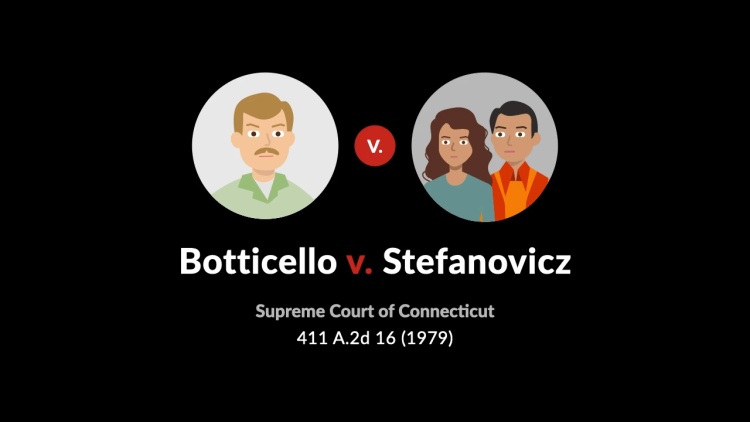Botticello v. Stefanovicz
Connecticut Supreme Court
177 Conn. 22, 411 A.2d 16 (1979)
- Written by Ronald Quirk, JD
Facts
Mary and Walter Stefanovicz (defendants) owned a farm as tenants in common. Mary and Walter each had an undivided half interest in the farm. When Mary and Walter purchased the farm, Walter attended to many of the business matters of running the farm, including paying the mortgage, taxes, and insurance. Botticello (plaintiff) subsequently visited the farm and commenced negotiations with Walter to buy it. Walter and Mary discussed selling the farm, and Mary said that she would not sell it for less than $85,000. Botticello and Walter agreed to a price of $85,000 and executed a lease with an option to purchase the farm. Walter signed the lease/option-to-purchase agreement (the agreement) on his own, without representing that he was acting on behalf of Mary. After taking possession of the farm, Botticello regularly paid rent and openly made extensive improvements to the property. Several years later, Botticello exercised the option to buy the farm. Walter and Mary refused to honor the purchase option, and Botticello sued to enforce it. At trial, Botticello argued that regardless of whether a principal-agent relationship existed between Mary and Walter, the agreement was binding on Mary because her actions, including accepting Botticello’s rent payments and acknowledging his land improvements, showed that she had ratified it. The trial court decided in favor of Botticello and ordered specific performance of the agreement.
Rule of Law
Issue
Holding and Reasoning (Peters, J.)
What to do next…
Here's why 907,000 law students have relied on our case briefs:
- Written by law professors and practitioners, not other law students. 47,100 briefs, keyed to 996 casebooks. Top-notch customer support.
- The right amount of information, includes the facts, issues, rule of law, holding and reasoning, and any concurrences and dissents.
- Access in your classes, works on your mobile and tablet. Massive library of related video lessons and high quality multiple-choice questions.
- Easy to use, uniform format for every case brief. Written in plain English, not in legalese. Our briefs summarize and simplify; they don’t just repeat the court’s language.





